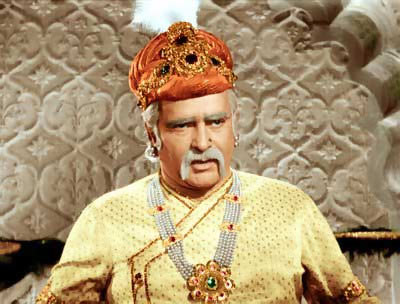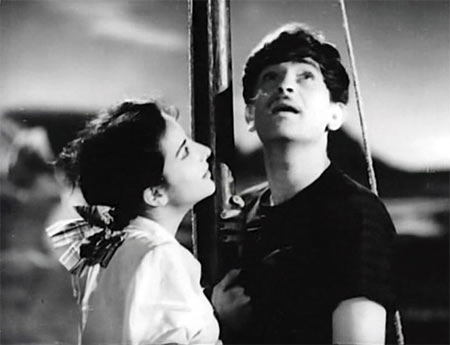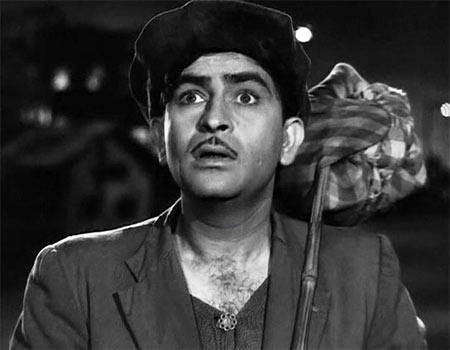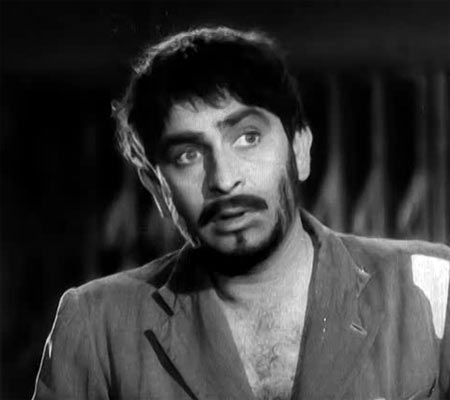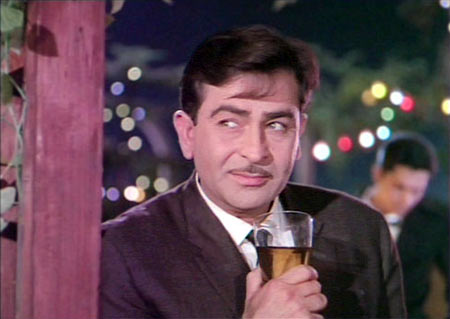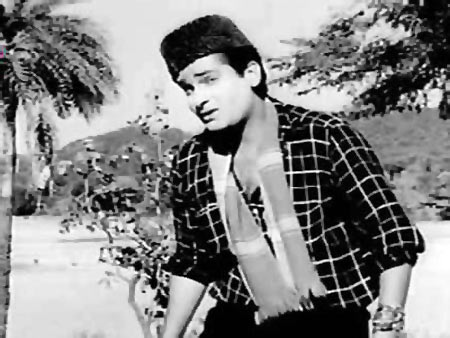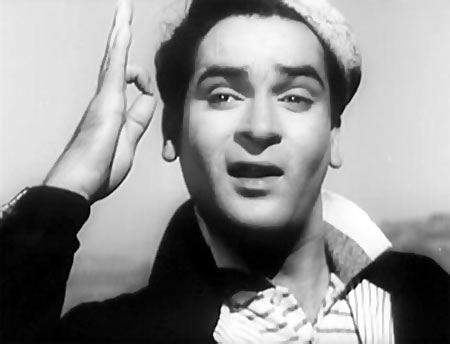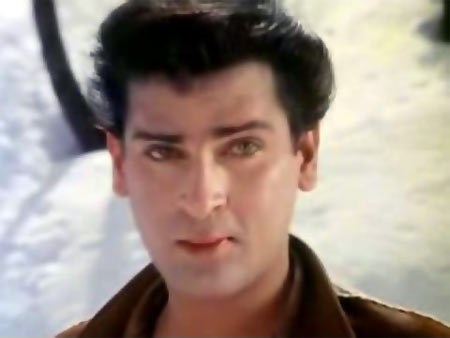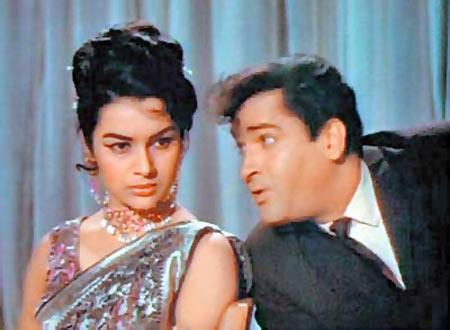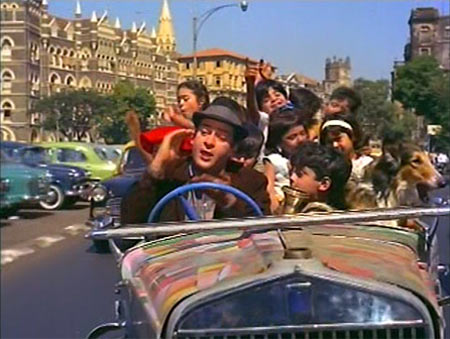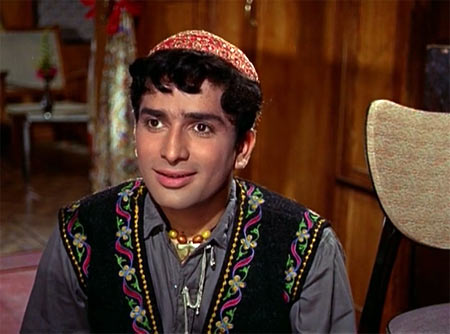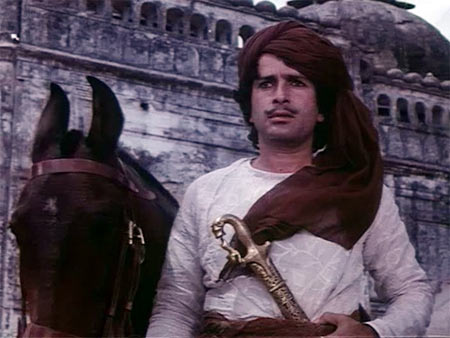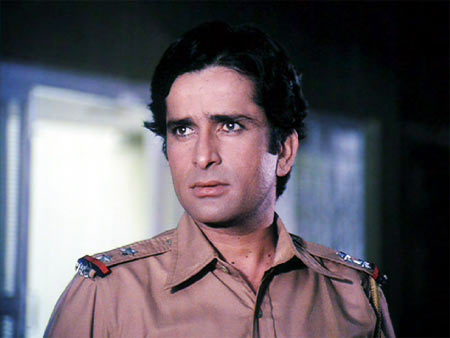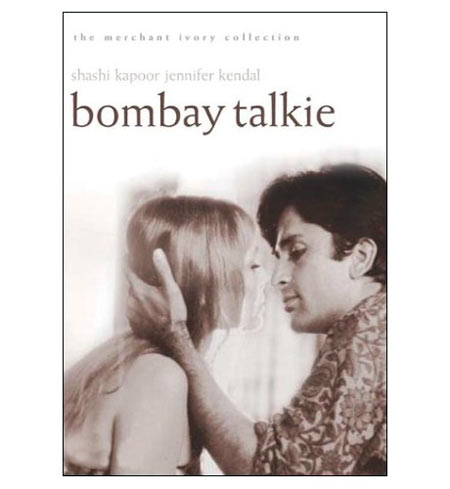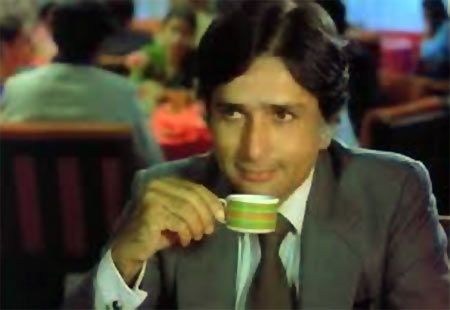This article was first published 14 years ago
The Best Of The Kapoors
Last updated on: November 29, 2011 16:40 IST
Image: Prithiviraj Kapoor in Mughal-E-Azam
Ranbir Kapoor is the latest in the Kapoor clan to establish his credentials as an actor with his performance in the just released Rockstar but it all started with the patriarch Prithiviraj Kapoor, more than eight decades ago.
Prithviraj Kapoor started his acting career in the silent era with small roles. After acting in nine silent films, he got to play the lead in Cinema Girl in 1929. He had a small role in the first talkies film, Alma Ara, too.
Prithviraj's performance in the film Sikander, as Alexander the Great, was highly appreciated. He went on to act in Sikander-E-Azam (1962) where he played King Porus; in fact his voice and demeanour suited the many roles of kings and princes that he played in his career.
Today's generation probably remembers Prithiviraj only for Mughal-E-Azam, the colourised version of which was released in 2004. One of the most celebrated films in the history of Hindi cinema, it took 10 years to complete.
Dilip Kumar played the role of Salim in the film, and Prithviraj, of course, was his father Emperor Akbar.
There are many stories about how Prithiviraj got ready to play the role of Akbar. Once the make-up and costume were on, Prithviraj would look at himself in a full-length mirror before every shot. Once K Asif asked him why he did that and he replied 'in order to get under the skin of my character'.
Prithviraj Kapoor founded a film dynasty. We take a look at the best performances by the first generation of Kapoors that followed him -- his sons, Raj, Shammi and Shashi Kapoor.
Take a look, and do list your favourite Kapoor performances as well.
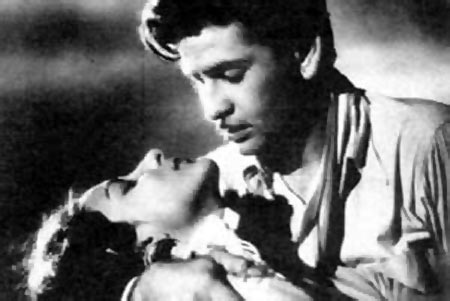
Image: A scene from Barsaat
Raj Kapoor was the most popular Kapoor of his generation. He acted, directed and produced Barsaat, in which Nargis played as memorable a role as Raj Kapoor.
The Raj-Nargis chemistry was seen in the same year in Andaaz, and the pairing became famous.
Barsaat was such a huge hit that Raj Kapoor bought RK Studios with the money he earned from it, and the scene in the film where Raj Kapoor holds Nargis with one hand and a violin in the other, became the RK emblem.
Image: A scene from Awaara
Awaraa was quite a family gathering with Raj Kapoor's father Prithviraj, his grandfather Dewan Basheswarnath and brother Shashi Kapoor all starring in it.
Directed by Raj Kapoor, it had a galaxy of technical talent: writers K A Abbas and V P Sathe, cameraman Radhu Karmakar, and art director Achrekar.
So successful was the pairing of Raj and Nargis, that Raj Kapoor worked exclusively with Nargis for the next five years. Incidentally, Awaara was the first film to be shot in Raj's newly-built RK Studios.
Awaara was a huge hit in India, but its fame spread when it was released in the then USSR as Brodigaya in 1954.
Image: A scene from Shree 420
Raj Kapoor was heavily inspired by Charlie Chaplin, whether it was in Awaraa or Shree 420.
The combination of the flamboyant Raj Kapoor, the moralistic Nargis and the wealthy and corrupt Nadira, worked brilliantly. The two-lovers-under-an-umbrella magic of Pyar Hua Iqrar Hua is still potent.
Image: A scene from Jagte Raho
Raj Kapoor produced and acted in Jagte Raho but it was directed by Amit Maitra and Sombhu Mitra.
As a poor villager who comes to the city in search of a better life and gets trapped in the greed and corruption of city life, Raj Kapoor's acting in this film was memorable.
Nargis had just a cameo role in the climax scene.
Image: A scene from Sangam
Sangam was Raj Kapoor's first colour film. It was probably the first Indian film to be shot in foreign locales, followed by Love In Tokyo (1966), Evening In Paris (1967), Around The World (1967).
Raj Kapoor and Vyjayanthimala played the husband and wife who love and hurt one another. Though it's fun to see Raj Kapoor dance to O Mehbooba, it's his portrayal of the suspicious husband and heart-broken man that is memorable.
Image: A scene from Tumsa Nahin Dekha
Directed by Nassir Hussain, Tumsa Nahin Dekha was made to promote actress Ameeta. While it did nothing for Ameeta's career, it made the hitherto struggling Shammi Kapoor, an overnight sensation.
Shammi developed his own youthful style of the comic dancing hero, and since it went over so well with audiences, he mostly signed films of the same type.
The film was initially offered to Dev Anand who refused because of Ameeta.
Image: A scene from Dil Deke Dekho
In the same style as Tumsa Nahin Dekha, this film, also directed by Nassir Hussain, became a box office hit.
It was Asha Parekh's first film and released on Asha's 17th birthday.
In Dil Deke Dekho, Shammi's character was slightly serious, as a man whose father has abandoned his mother and who has to constantly keep on proving his identity.
Image: A scene from Junglee
In Junglee, Shammi woos yet another newcomer, the frail beauty with the shrill voice, Saira Banu.
A musical comedy, it boosted his career further and made him the youth icon of those days. The song Yahoo became the symbol of Shammi's wild lover-boy image.
It was remade in Telugu as Saradaa Ramudu in 1980.
Image: A scene from Teesri Manzil
A Bollywood thriller directed by Vijay Anand and produced by Nassir Hussain, it starred Shammi Kapoor and Asha Parekh in the lead and Nazima, Premnath, Prem Chopra, Iftekhar, Helen, K N Singh and Salim Khan as supporting cast.
The film was another hit and remains popular to this day.
Shammi Kapoor's wife Geeta Bali died during the filming of Teesri Manzil.
Image: A scene from Brahmachari
Shammi Kapoor got his first Filmfare award for this film co-starring Rajshree. The film was remade in Telugu as Devudu Mamayya.
Shammi plays the golden-hearted, day-time photographer who has no money but an entire family to take care of as he is providing home to orphans.
Brahmachari is soft in his manners and extremely protective of his kids.
Image: A scene from Jab Jab Phoole Khile
It was now the turn of Shashi Kapoor to make his presence felt with the muti-starrer Waqt and Jab Jab Phool Khile which released the same year.
He plays an exuberant shikarawala who falls in love with a memsaab but whose spirit is crushed when she transplants him to the city.
Shashi was truly endearing in the film. He projected joie de vivre (in Humko Tumse Pyar Aaya) as well as pathos (in Yahan Main Ajnabee Hoon).
Raja Hindustani, starring Aamir Khan and the next generation Kapoor, Karisma, was a remake of Jab Jab.
Image: A scene from Junoon
Shashi Kapoor had enough faith in director Shyam Benegal to produce this film, which also allowed him to play the kind of role he wanted to.
Shashi acted with intensity and passion the married nawab who risks all for the love of an English prisoner (Nafisa Ali).
Image: A scene from Deewar
One of the iconic films of Indian cinema, often listed in the top 25, it won Shashi a supporting actor award.
Though it is seen as an Amitabh Bachchan film, Shashi's role is a memorable one and his one-liner -- Mere paas maa hai -- has become undeniably the most famous in Hindi cinema.
It's less well known that Rajesh Khanna and Navin Nischol were offered the role.
Image: A poster of Bombay Talkie
Shashi Kapoor starred in many British and American films, most notably the Merchant-Ivory productions.
In Bombay Talkie, he starred opposite his wife Jennifer Kendal. She played the role of the British author who falls in love with a famous Bollywood actor who is married.
Image: A scene from Kalyug
Directed by Shyam Benegal, the film is a modern-day take on the epic Mahabharat, where the celebrated fight is between two rival business houses.
If Rekha's character was based on Draupadi, Shashi Kapoor's was based on Karna; he plays the illegitimate son of one of the business families.
